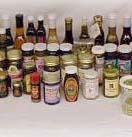Lots of people make great-tasting homemade foods like dips, pickles or salsa. But, just like opening a restaurant isn’t as simple as throwing good dinner parties, moving a good product into commercial production takes a lot of work – including recognizing hazards and controlling them. 
To reduce risks to business and brand damage, food retailers usually place a lot of requirements in place for suppliers prior to carrying their products – things like proof of inspection, a validated process, visits to the processor and insurance. These precautions don’t eliminate problems but are an indicator that a retailer is paying attention.
While requirements like these are anecdotally reported at some farmers’ markets, the same level of vendor verification isn’t always in place.
One of the ultimate truths in food safety is that putting low acid foods in a jar and sealing them without either acidifying (with vinegar/fermentation) or processing correctly is a bad idea. Correctly means that someone has validated the process and the operator knows how to verify that their procedure works every time.
In June 2012, the California Department of Public Health (CDPH) urged people to avoid and dispose of One Gun Ranch and Organic Soup Kitchen soups sold at farmers markets in California because they potentially contained botulinum toxin. The vendors involved were quoted as saying they didn’t know the rules (or the risks). Although none of the products tested positive for the toxin (fortunately), the process/procedure to limit the germination of Clostridium botulinum and toxin outgrowth wasn’t validated by anyone.
CDPH is yet again warning patrons of a couple of California farmers markets to avoid a vendor’s wares (those produced by 7TH Heaven Gourmet) for the same reason – lack of validated processing.
No illnesses have been linked to any of the affected products at this time.
7th Heaven Gourmet of Hesperia, California is voluntarily recalling the following varieties of spreads: Pate Mediterraneo and Eggplant & Shitake Tapenade. These products were sold under the 7th Heaven Gourmet label and packaged in 8 ounce, glass jars with screw-on metal lids. These food products lack production or date codes. Photos of affected products may be obtained HERE.
7th Heaven Gourmet jarred spreads were available for purchase between September 2011 and July 2012, and only sold at the following Farmer’s Markets:
• Victorville Farmers Market (Victor Valley College) 18422 Bear Valley Rd, Victorville, CA
• Victoria Garden Farmers Market, 12505 North Mainstreet, Rancho Cucamonga, CA
Consumers in possession of the recalled products should discard them in the trash.

 stores are X-rayed to make sure there’s nothing inside but pie.
stores are X-rayed to make sure there’s nothing inside but pie.  said: "anything in foil, foil tops or cans" and a lot of glass bottles.
said: "anything in foil, foil tops or cans" and a lot of glass bottles.
 "at least three weeks" and a respirator under general anesthesia. The first symptoms manifested themselves in the aftermath of Sunday dinner.
"at least three weeks" and a respirator under general anesthesia. The first symptoms manifested themselves in the aftermath of Sunday dinner. within arm’s reach, I jam it in my mouth.
within arm’s reach, I jam it in my mouth. the First Commercial Kitchen plant.
the First Commercial Kitchen plant. nearly double during the next several decades, for the future world population.
nearly double during the next several decades, for the future world population. The problem with such refrigerated, ready-to-eat foods is listeria, the bacterium that’s everywhere and grows at refrigerator temperatures.
The problem with such refrigerated, ready-to-eat foods is listeria, the bacterium that’s everywhere and grows at refrigerator temperatures.  Researchers from USDA’s Agricultural Research Service (ARS) in Wyndmoor, PA, found greater inactivation rates of Listeria monocytogenes occurred in samples processed at higher temperatures and in samples containing higher concentrations of salt and smoke compound. The inactivation rate increased tenfold when the temperature increased by 5° C, indicating that smoking temperature is a main factor affecting the inactivation of the pathogen. In addition, salt and smoke compounds also contribute to the inactivation effect.
Researchers from USDA’s Agricultural Research Service (ARS) in Wyndmoor, PA, found greater inactivation rates of Listeria monocytogenes occurred in samples processed at higher temperatures and in samples containing higher concentrations of salt and smoke compound. The inactivation rate increased tenfold when the temperature increased by 5° C, indicating that smoking temperature is a main factor affecting the inactivation of the pathogen. In addition, salt and smoke compounds also contribute to the inactivation effect. 
.jpg)
.jpg) "There should be stringent laws, licensing laws, to make sure produce is only used in season and season only. If we don’t restrict our movements within this industry of seasonal-produce only, then the whole thing will spiral out of control."
"There should be stringent laws, licensing laws, to make sure produce is only used in season and season only. If we don’t restrict our movements within this industry of seasonal-produce only, then the whole thing will spiral out of control." Me, I’m a fan of freezing, canning, fresh and whatever. It’s about mixing it up. Frozen corn, peas (left) and others, canned tomatoes and sauces, the garden out back, Amy and I got it all (and enjoyed our first spinach and lettuce salad of the season this evening, with frozen scallops, which don’t grow so well in Manhattan — Kansas).
Me, I’m a fan of freezing, canning, fresh and whatever. It’s about mixing it up. Frozen corn, peas (left) and others, canned tomatoes and sauces, the garden out back, Amy and I got it all (and enjoyed our first spinach and lettuce salad of the season this evening, with frozen scallops, which don’t grow so well in Manhattan — Kansas).